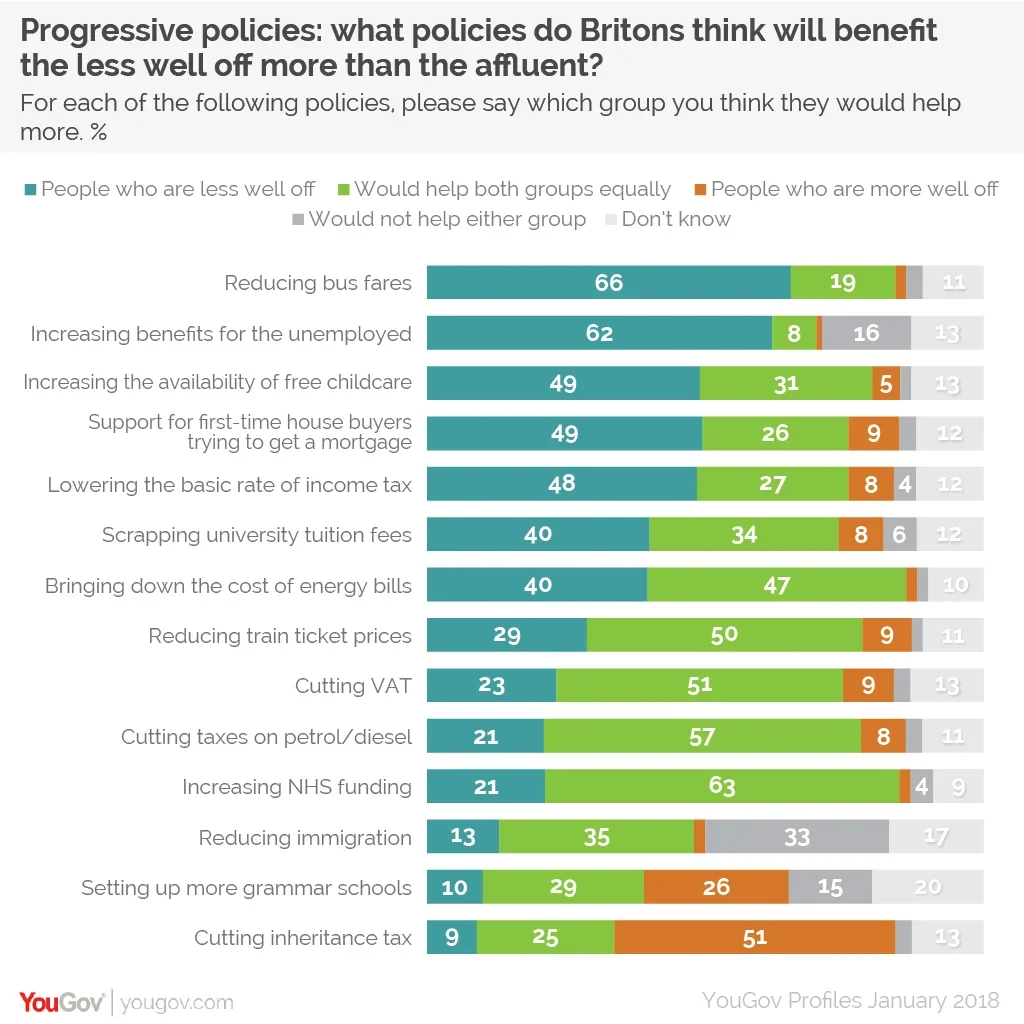YouGov asks the public which of 14 policies would do more to help the less well off
Headlines at the very beginning of the year were dominated by the revelation that rail fares were being hiked by an average of 3.4%.
There were subsequent calls for ticket prices to be frozen or cut, but the case has been made that such a move would actually be “welfare for the rich”.
The argument goes that because rail commuters are more likely to be wealthier – poorer Brits having long been unable to afford to travel to work by train – that freezing fares would mainly be putting money in the pockets of the more affluent.
Politicians sometimes talk about “progressive” and “regressive” policies. While the full definitions vary and can be relatively complex, a good approximation is that a progressive policy is one that helps poorer people more than it helps richer people, while a regressive policy is one that helps richer people more than it helps poorer people. Under this definition, a train fare freeze would be a regressive policy.
Now a new YouGov study finds out to what extent the British public sees a selection of policies as progressive or regressive. We put 14 policies to the public and asked who they were more likely to help: less well off people, more well off people, both groups equally or neither at all.
More for the poor
Reducing bus fares is the policy from the list that the public see as the most progressive, with 66% of Brits believing that it would benefit people on lower incomes more than the affluent. This is a far greater rate than the 29% who think reducing train ticket prices would be a bigger boon for the less well off, as well as the 21% who think the same of cutting taxes on petrol or diesel.
That isn’t to say that people don’t think cutting rail fares or fuel costs will help the poor, simply that they don't think they will poorer people any more than they would help richer Brits – 50% think cutting train ticket prices helps both groups equally, for example, as do 57% for cutting diesel/petrol taxes.

Other policies that are seen as particularly progressive are increasing benefits for the unemployed (62%), increasing the availability of free childcare (49%), supporting first time house buyers trying to get a mortgage (also 49%) and lowering the basic rate of income tax (48%).
Scrapping tuition fees is seen by 40% as more helpful to those who are less well off. It has been claimed that the reason Justine Greening was forced from her post as Secretary of State for Education at the recent reshuffle was because she refused to cut tuition fees, which the Conservatives seem to see as a key move in regaining support among young people.
While tuition fees may now soon be cut (and scrapped altogether should Labour come to power), it may be the case that such moves actually benefit the affluent more than the poor. As a recent article in the New Statesman explains, because only richer graduates are likely to be able to pay off their full tuition, cutting the level of that tuition effectively constitutes a tax-break for higher earners.
Boons for the rich
Only two of the fourteen policies were seen as more likely to help richer people than poorer people. First is the expansion of grammar schools, which a quarter (26%) of Brits think is regressive, compared to only 10% who think it is progressive (although a further 29% think it would help both groups equally, while 15% think it will help neither).
Cutting inheritance tax is more emphatically seen as a boon for richer Brits, with half the nation (51%) saying it would do more to help the more well off compared to only 9% who think it will do more for the less well off (25% think it would help both equally).
Nevertheless, despite being seen as benefiting rich people more, cutting inheritance tax would be extremely popular. In fact, when YouGov asked Brits back in 2015 whether they thought each of 11 taxes were fair or unfair, inheritance tax was seen as the most unfair at 59%.
Photo: Getty









